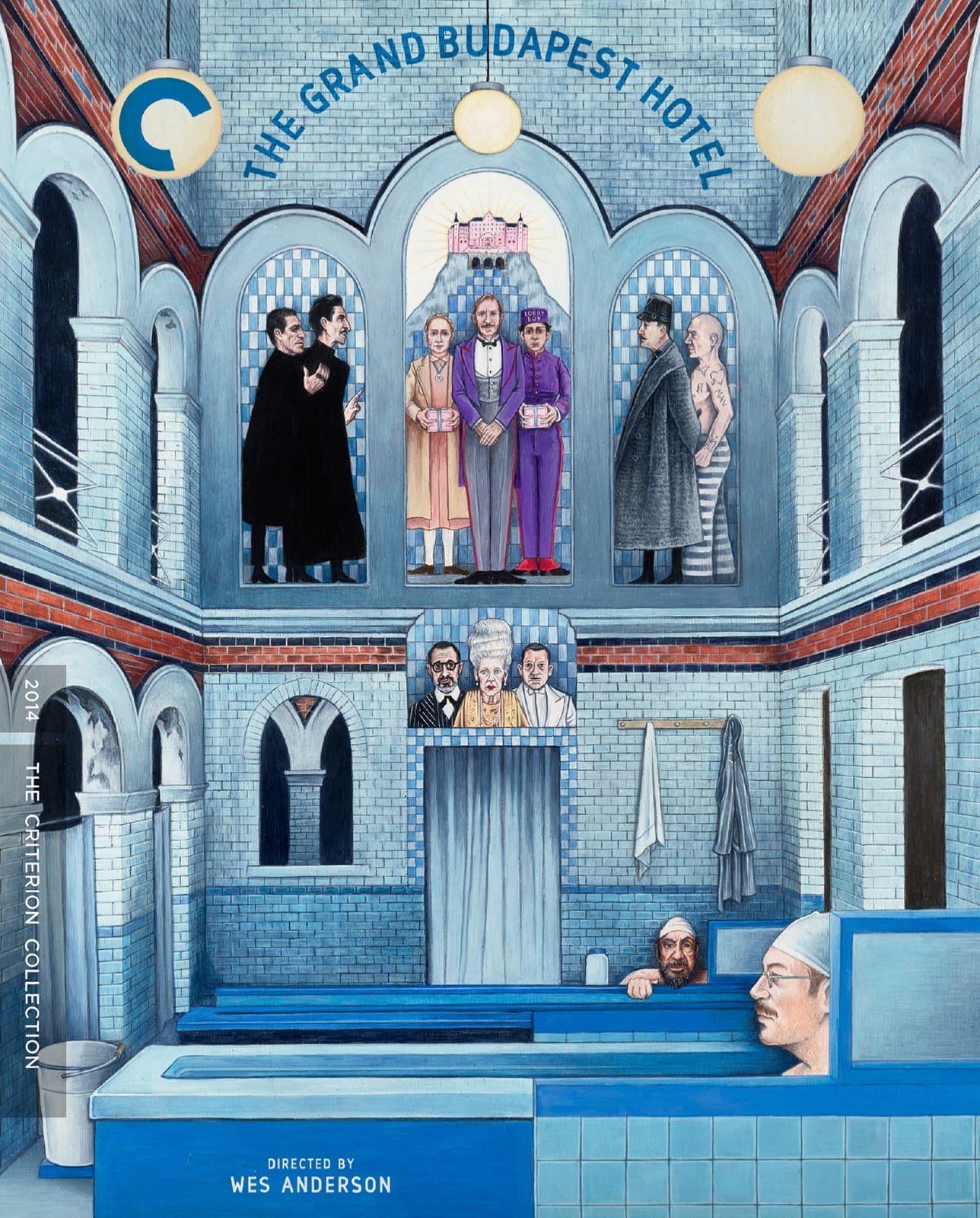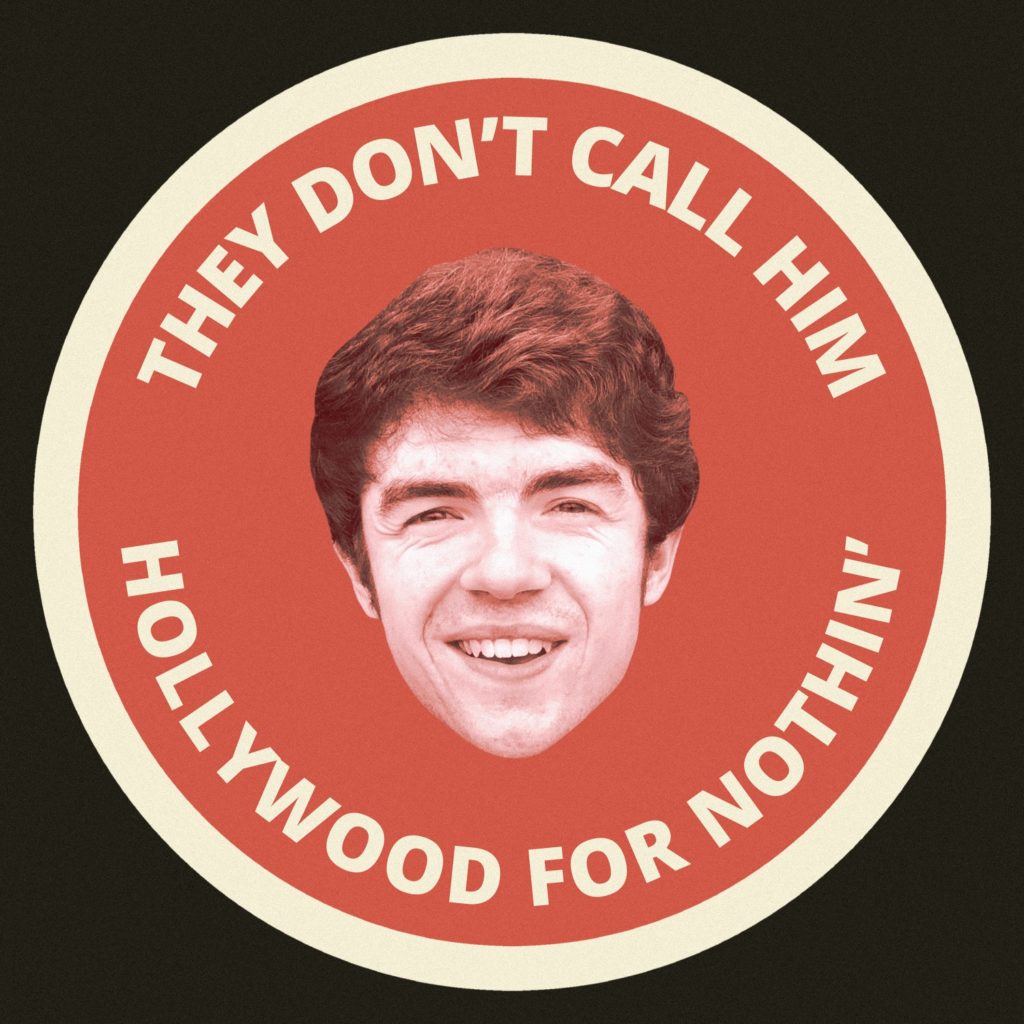
20 Oct The Wes Anderson Collection: The Grand Budapest Hotel
dir. Wes Anderson, starring Ralph Finnes, Tony Revolori, Adrien Brody, Willem Dafoe, Saoirse Ronan, et. al
The Grand Budapest Hotel
At first glance, there is a lot to be said about Wes Anderson’s 2014 film The Grand Budapest Hotel solely from a technical angle. Whether it is the exquisite symmetry and balance of the cinematography, the rich and luscious color of the production design and art direction, or the exaggerated costuming and hair and makeup – there is always something to appreciate from a pure visual standpoint. It is no wonder that this film was the winner of four Oscars in 2015 – Best Costume Design (Milena Canonero), Best Makeup and Hairstyling (Frances Hannon and Mark Coulier), Best Production Design (Adam Stockhausen and Anna Pinnock), and Best Original Score (Alexandre Desplat). All of these artists behind the scenes deserve their due praise, but it is the screenplay from Anderson and story from Hugo Guinness – inspired by the writings of Stefan Zweig – that caught my attention.
There are three different timelines at hand during The Grand Budapest Hotel. The narrator – an author played by Tom Wilkinson – is in 1985, reflecting back on the overarching story. In 1968, the author’s younger self is portrayed by Jude Law. Dealing with writer’s block, he has made a trip to the eponymous hotel tucked away deep in the mountains of the fictional European country of Zubrowka. Here, he meets the hotel owner, Mr. Zero Moustafa (F. Murray Abraham), who sits down and tells the young author the zany, absurd, and preposterous story of the adventure that resulted in his ownership of the Grand Budapest. This takes us back to 1932, in which a very young Zero Moustafa (Tony Revolori) is the lobby boy in the establishment. With his position comes a working relationship with Monsieur Gustave (Ralph Fiennes), the hotel’s concierge who takes great pride in dignity and professionalism. He runs a tight ship and holds everyone around him to a high standard, including Zero. This portion of the chronology focusing on the narrative of Zero and Gustave is where we spend the majority of the time in the film. With a relatively moderate runtime of 100 minutes, the first half hour or so of The Grand Budapest Hotel eases into its rhythm, without seeming to be in any hurry to get where it’s going. Up until the end of the first act, I remained casually intrigued by the quirky characters and marvelous cast of A-list Hollywood talent that kept growing by the minute – seriously, Anderson and his casting directors know how to put together an ensemble. The gorgeous aesthetic of the picture as well – captured by the lens of DP Robert Yeoman – had me in awe. The light balance and color grading accentuating every corner of the frame – it’s beautiful stuff. But, I was somewhat skeptical of the narrative itself and its trajectory. I feared that the whole movie would dawdle along at this relaxed pace, leaning a bit too heavily into its prettiness at the expense of its depth. Thankfully, these doubts were laid to rest as soon as a rich old lady died in the movie. That last sentence out of context may come across as rather blunt at best and disrespectful at worst, but the fact of the matter is that this plot development incites the domino effect of all the excitement and tomfoolery to follow in the story of Zero and Gustave.
I am going to avoid specificities and details to refrain from leaking spoilers, but here are a few key points for the sake of clarity and context: There is a fortune of wealth in play with the passing of the aforementioned rich old lady, as she leaves behind quite the inheritance in her will. There are dozens of extended family members lobbying for what they believe to be their “rightful” spot as the heir(s). And, as it goes, there is also suspicion of foul play with her death. Oh yeah, and a war is beginning to brew in Zubrowka. Caught in the crossfire of this madness are Zero and Gustave. At this juncture, the narrative takes on an identity with a lineage that can be traced back to Charlie Chaplin’s 1921 silent feature The Kid. An adult (Gustave) and a much younger travel companion (Zero) embark on a journey filled with mischief and antics. There are indeed stakes – both internal and external. A lot hangs in the balance on a uniquely personal level, but also in a much more volatile sense in terms of the potential ramifications of various character decisions. Simply put, Zero and Gustave learn a lot about themselves, each other, and the world around them over the course of their capers and shenanigans. They are an unlikely pair who just so happen to be precisely what the other needed at that moment in time.
Once the snowball starts rolling, it doesn’t let up, and any reservations about story direction I had in the first act become a distant memory. Everything that I loved in those first 30 minutes of the film maintain their effectiveness throughout the rest of the runtime – but now, they are working in accordance with a narrative becoming more enticing with each passing minute. You have prison escapes, sled chases down a mountain, Willem Dafoe as a psychopathic hitman, scene-stealing appearances from the likes of Harvey Keitel, Bill Murray, and Owen Wilson – it’s all quite wonderful in the most subversive and darkly humorous ways.
As it all wraps up, what is The Grand Budapest Hotel saying, exactly? Well, there’s definitely some commentary on the trope of happy endings and heroic victories in storytelling – particularly, how the real world rarely offers these. A lot of shitty things happen, even to good people who deserve better. But, sometimes through some combination of skill, luck, fate, and sheer determination, things pan out for decent folks. To paraphrase Martin Luther King Jr., the universe may yet be slowly bending in an arc of justice, even amidst the violent chaos that rages against it. Is there a rhyme or reason behind it all? Maybe. Or maybe it’s just all random and anarchic. That all depends on one’s individual beliefs about the order of nature.
Consider the following quote from the film, from two different perspectives. As Mr. Zero Moustafa sits with the young writer in 1968, reflecting on the events from 1932, he says of Gustave: “There are still faint glimmers of civilization left in this barbaric slaughterhouse that was once known as humanity…He was one of them. What more is there to say?” Mr. Zero Moustafa was actually quoting Gustave, who had this to say at one point during their 1932 ventures: “You see, there are still faint glimmers of civilization left in this barbaric slaughterhouse that was once known as humanity. Indeed, that’s what we provide in our own modest, humble, insignificant… oh, fuck it.”
Whether you align more with Mr. Moustafa’s more optimistic perspective, or Gustave’s “oh, fuck it” viewpoint, Wes Anderson’s The Grand Budapest Hotel presents itself to you just as it is. However you take it is up to you. And it’s a damn good movie either way.
Special guest review by Thomas “Hollywood” Manning, contributor to Elements of Madness and Executive Producer on the award-winning documentary The Dancin’ Bulldogs


No Comments